You can view the slides, you can watch the recordings, but if you're wondering what's really happening at RIPE 88, read the daily meeting blog!
Day 5: A magical morning - and why there’s no Wifi in the toilets
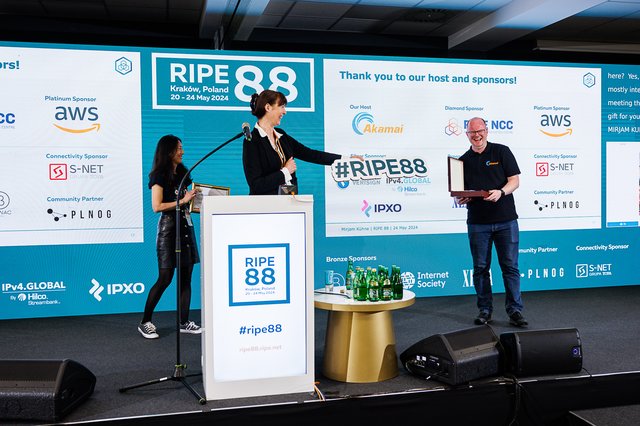
With 546 attendees onsite, 175 joining online, and 1,300 cups of coffee consumed per day RIPE 88 has concluded.
Last Day, Best Content
After a magical RIPE dinner, we were ready to start Day 5 of RIPE 88. The PC added their own magicl touch by starting the morning 30 minutes later, resulting in a full and significantly more awake room (thank you PC!).
Friday morning speakers are the best, as Antonio Prado pointed out. RACI fellow, Khwaja Zubair Sediqi took us through an exploration of RPKI synchronisation delays. Then on to the lightning talks. Andrei Robachevsky gave some interesting updates on MANRS, which is ten years old this year and currently has 1,100 participants across the globe! Maria Matejka then talked about simulating networks in your laptop after which Jeff Osborn turned to the problem of making DNS comprehensible to the wider world of people who have to work together to keep it running. As Jim Reid pointed out, that's a two way street - DNS people also need to work to understand the language and needs of policy makers and others. We’re now waiting for Google Translate to launch a DNS to policy feature…
Imagine a perfect Internet! That’s how Tobias Fiebig started his Closing Plenary presentation on Revisiting BCP194, calling on the community to provide feedback on ongoing drafts and to engage with policymakers to ensure that BGP security practices remain effective, practical, and adaptable.
Beware of Outages!
We then heard the RIPE Code of Conduct Team Report who received three reports at RIPE 88. Please treat each other nicely and make sure that the RIPE community stays a safe environment for everybody.
Ondřej Caletka from the RIPE Meeting Tech Team presented the traditional Tech Report. Apparently the meeting venue has been known to have power outages. Well, just like the storms, we’re glad they didn’t happen this week.
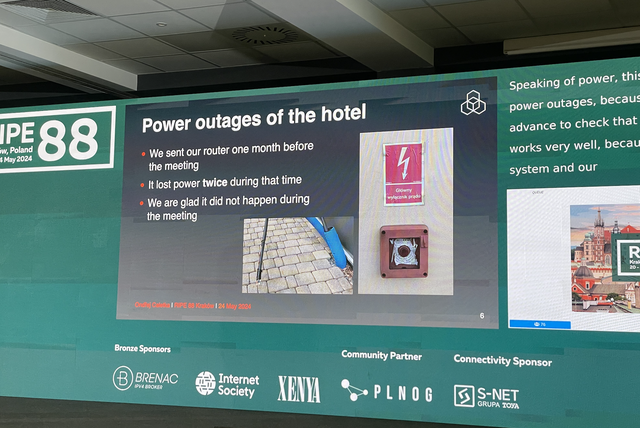
Although the power situation at the hotel was a hot topic for discussion, the wi-fi connectivity in the toilets and the lunch area was an even hotter topic. Ondrej’s advice - focus on the business at hand.
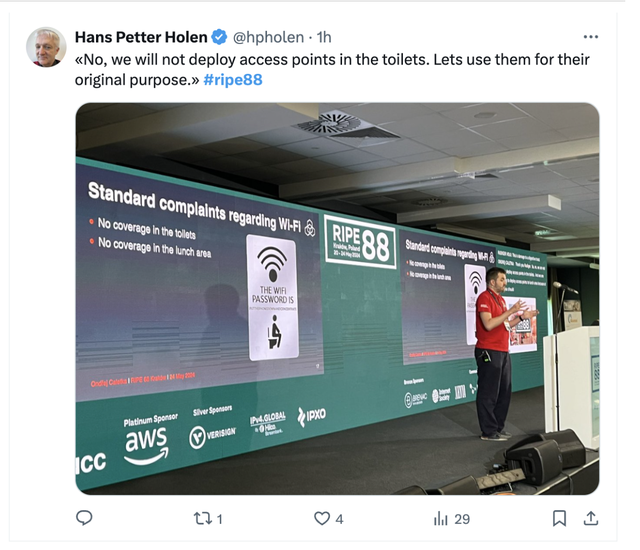
A special mention was made of our wonderful stenographers, the Natural Intelligence of this event!
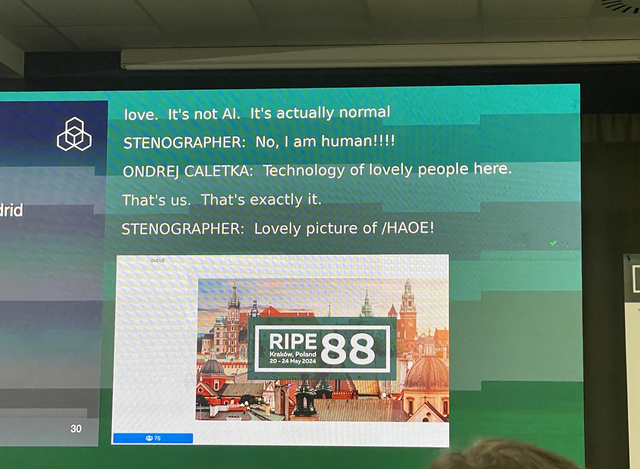
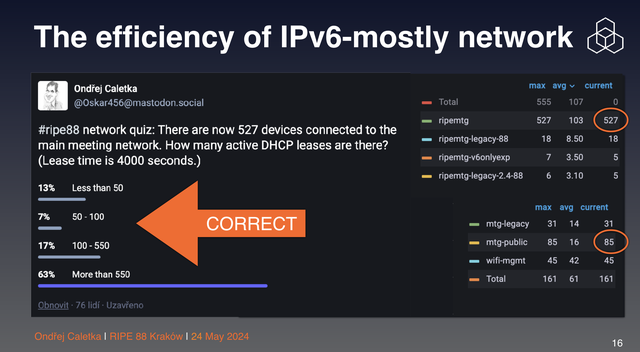
The network is not yet IPv6 only but - IPv6-mostly! And what is their efficiency? Ondrej’s poll concluded showed that most of us didn’t get it right.
Mirjam Kühne, RIPE Chair, closed the session with a number of congratulations and updates. Congratulations to the elected PC members - Massimiliano Stucchi and Kevin Meynell, and the new working group chairs.
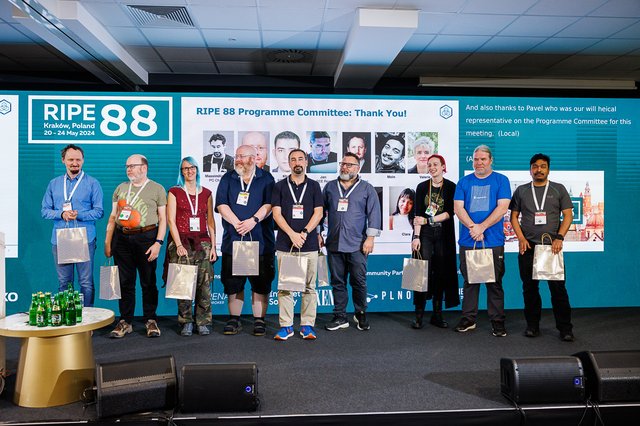
We wrapped up the event with another warm moment, our event organiser Wan-Min celebrates her birthday today - her hard work has kept this meeting going!
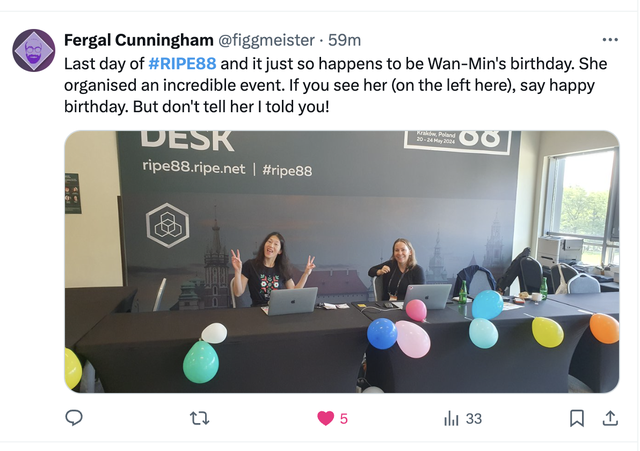
A big thanks to everyone involved in RIPE 88, the attendees, the PC, organisers, and of course our host Akamai and all our lovely sponsors.
See you in Prague!
Thursday: There be cake!
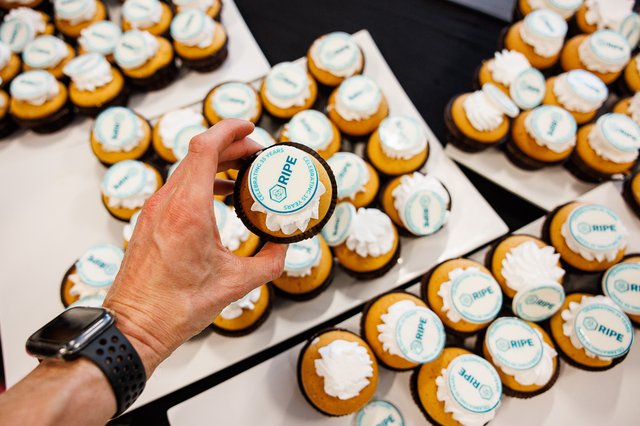
Thursday is the second full day of Working Group sessions. As is tradition, the day kicked off with various WG Chairs and other presenters lamenting the fact that they stayed so late at the Whisky BoF the night before. This calls to mind that old cliche about insanity being trying the same thing expecting different results.
Cooperation
Well rested, fresh and fluffy in the Cooperation Working Group, Julf Helsingius opened the session with an announcement that Desiree Miloshevic was re-selected for another term as co-chair. Congrats, Desiree! Emmanuel Kessler, Head of the Prevention and Outreach Team at EUROPOL, was the first presenter. He introduced the agency, its goals to tackle cybercrime and how it works in collaboration with other stakeholders. In the following discussion, he noted that while the rise of AI made it harder to stop some malicious actors (some even using their own ChatGPT clones on the Dark Web), it could be a useful tool for law enforcement to process a lot more information than before. Next we heard from Jeanette Hofmann of HIIG and Weizenbaum Institute, who shared the story of NETMundial +10 and the aim of this update to the original NETMundial. The goal was to produce a more flexible document that brought in more stakeholders, provided benchmarking guidelines for an effective multistakeholder model of governance and discouraged the reduplication of existing Internet governance processes.
Talks continued with Osama Al-Dosary of Saudi Internet Exchange (SAIX), introducing SOLID, a new web infrastructure that is intended to bring decentralisation back to the Internet. Rather than keeping data in walled gardens held by major companies, SOLID features shared data pods, giving more freedom for developers to innovate and end users more control over their data. Last, we heard from Romain Bosc of the RIPE NCC, who shared what’s going on with EU regulation and the RIPE NCC’s priorities and engagement efforts in this area.
Database
In the side room, the day began with an early but super well-attended gathering of the Database Working Group. One item under discussion was the chair selection process - since this will be Denis Walker's last RIPE Meeting as DB WG Chair, someone needed to take his place. After some discussion, votes were cast in meetecho and the result: William Sylvester will carry on as chair for another year to fill the role Dennis left, Peter Hessler will join as new chair, effectively filling the role William just left (congratulations Peter!), and David Tatlisu stays put, carrying on in the role he hasn't left.
Next, Edward Shryane gave an operational update for the RIPE NCC Database team, covering progress since RIPE 87, work to be done this year, and also noting that RIPE NCC efforts to migrate the RIPE Database to the cloud have been stopped (a decision the room responded to well). Dmitry Kohmanyuk talked about adding contact methods in Whois and RDAP, and Dennis gave a run through of NWIs. Before he left the stage, William led the group in thanking Denis for all his hard work as chair and with the RIPE Database over the years - as he goes off into retirement, worry not, this is not the last we'll hear from him on the mailing list.
IPv6
Introduced by Raymond Jetten, as a "proud and much loved co-chair since back at RIPE 69", Jen Linkova stepped down from that role today. Nico Schottelius will replace her - let's all wish him luck!
Moving on to her talk, Jen talked about the work she's being doing to document IPv6 deployment success stories. She talked us through the draft, sharing a variety of useful recommendations and operational issues in her presentation.
Next up, Tobias Fiebig suggested moving away from IPv4-driven addressing plans, advocating for RFC8950. He highlighted using IPv4 with IPv6 next hop for a cleaner, IPv6-centric addressing architecture. Ondřej Caletka discussed IPv4-mapped IPv6 addresses, meant for IPv6 socket API compatibility, noting their misuse in public DNS for cost-saving reasons.
Connect
Remco van Mook and Florence Lavroff ended their terms as Connect WG chairs. When you see them in the hallway, be sure to thank them for their service and check out their T-shirts.
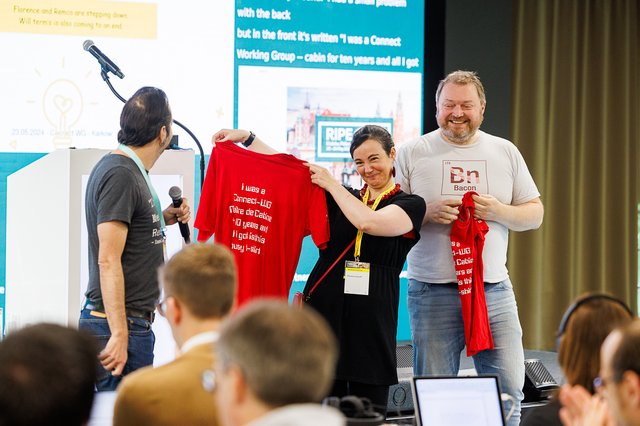
Stavros Konstantaras and Paul Hoogsteder were selected as new co-chairs. Stavros then stepped up to present on the BCOP for ending the use of non-authoritative IRR databases by route server operators. The BCOP proposal is nearing completion and will be sent to the mailing list soon.
In his talk, Andrei Robachevsky from the Global Cyber Alliance stressed the importance of improving the business case for MANRS implementation, encouraging enterprises to demand security controls from their providers. A MANRS task force was formed for active measurement of security controls. Paul Hoogsteder from PeeringDB gave updates on their work, including a beta version of a new website and a call for feedback.
Bijal Sanghani led a panel with Remco and Paul on the interconnection landscape's evolution, highlighting increased IXPs, concerns about openness, and the growing influence of regulatory and financial issues. They stressed the need for maintaining collaboration and openness despite these challenges, and raised the question of whether public streaming limits information sharing.
Open Source
Martin Winter (Co-Chair) recapped the chair selection. A surge of support statements from new, unrecognisable signups were disqualified. Sasha Romijn was re-elected, amidst confusion over voting terminology. Discussions on requiring RIPE meeting attendance and consistent WG policies followed, with strong support for these measures. Time ran out, and participants were encouraged to continue discussions with Mirjam.
Petr Špaček from ISC presented a survey on project trustworthiness. Feedback highlighted the need for better survey methodology and differentiation between audience and project needs. ISC’s QA was praised, and Petr was asked to blog the presentation. A lively debate on whether upstream projects should work closely with distributions or let them apply patches concluded that collaboration is better given the pace of modern software development. Maria Metejka from BIRD and CZ.NIC discussed the importance of having clear contribution policies. She encouraged feedback on the BCP Suggestion Draft.
Routing
The Routing WG session was also busy and engaging. The first speaker was Pawel Foremski who presented on BGP Pipe - an open-source BGP reverse proxy aimed at bridging gaps in routing and enabling innovation. Next, Ben returned to the stage to discuss - with the help of Zbyněk Pospíchal - the pros and cons of reclaiming 240.0.0.0/4 address space. An interesting talk that led to an interesting suggestion of using 240.0.0.0/4 to break IPv4 so people start using v6.
Job Snijders then delved into RPKI Re-Validation, proposing revisions to the RPKI validation algorithm to improve security and efficiency. Mikhail Puzanov followed with insights on low latency RPKI validation, discussing methods to speed up the validation process and ensure robustness against poorly behaving repositories.
Paul Hoogsteder wrapped up the session by detailing the chair replacement procedure, ensuring smooth transitions in leadership roles. The session was a testament to the dynamic and collaborative spirit of the Routing WG, with each talk pushing the boundaries of current practices and inspiring lively discussions among attendees.
RIPE community
The RIPE community plenary saw the usual update from the RIPE Chair team, highlighting the activities being undertaken. The succinctly named DNS Resolver Best Common Practice Task Force has wrapped up its work and published a report, while the Code of Conduct Team shed light on the codes they follow in a RIPE Labs article. The RIPE Chair selection process will get underway, concluding at RIPE 92.
Remco van Mook picked up the discussion where the BoF on Tuesday left off. There was debate on whether to follow the usual process of setting up a Task Force or Working Group or something else. And if you see the process through Remco, we can promise you another lousy t-shirt...
Hervé Clément shared an update on the ASO AC, which was full of ICANN's procedures. If you're a fan of acronyms, bureaucracy and structure, there's plenty to be found in his slides.
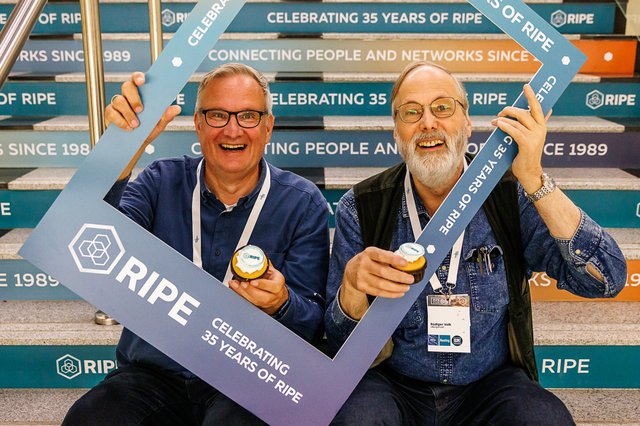
And finally, Mirjam reminded us that we're celebrating thirty five years of RIPE at this meeting. There was a round of applause for Daniel Karrenberg and Rüdiger Volk, veterans of RIPE 1, followed by (cup)cake.
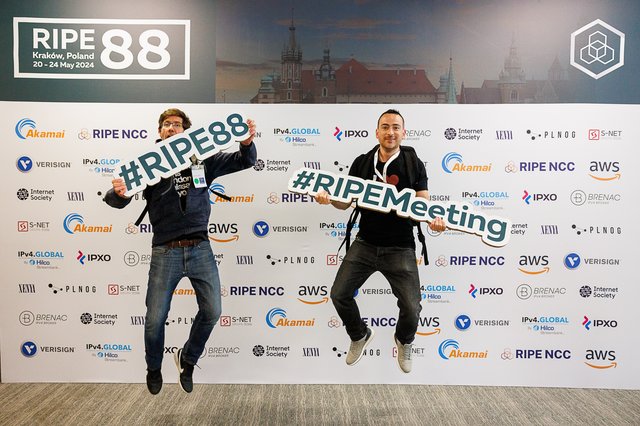
Diversity
The Diversity, Equity and Inclusion in Tech session focused on wellbeing - with talks on inner peace and neurodiversity, chaired by Vesna Manojlovic, our resident social justice activist. In what is probably a RIPE Meeting first, Natasja Mojsilovic managed to get everyone to look away from their screens and take a moment to meditate. She reminded us that we are more than what's written on our badges or our jobs and we need to think about our lives holistically.
Rob Lister made his RIPE Meeting debut in style. Apparently only 30-50% of people have an internal monologue (this blog author has at least five), but at RIPE Meetings the ratio is more like 90%. He "came out" as having ADHD, and his talk clearly hit home, with one of the longest mic queues seen at RIPE 88. Rob also takes the prize for the most spectacular jacket on stage.
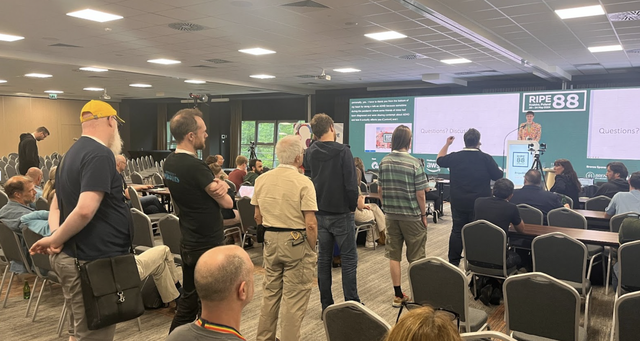
Wednesday: Watch out for the weather!
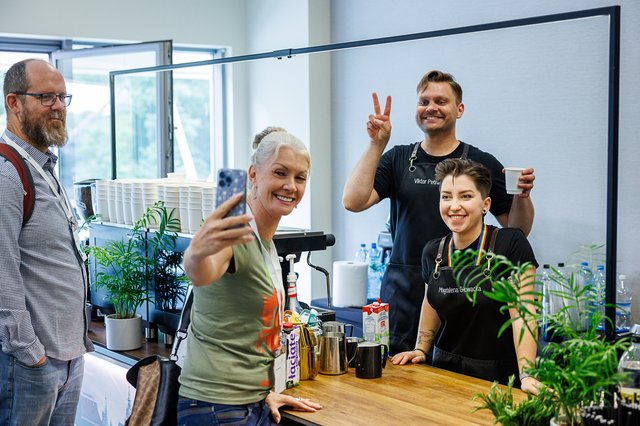
On the third day of RIPE 88, we continued with our WG sessions. In Address Policy, the session started with the selection of the new WG Chairs - congratulations to Erik Bais for being re-elected for two years, and to Alex le Heux for three years! Then, Hervé Clement gave a brief update on the activities of the ICANN ASO AC (Address Council) body, followed by Marco Schmidt, who asked for feedback from the community on current issues like the potential Trojan Horse of IPv6 stockpiling and increasing ASN requests. You can learn more about this on RIPE Labs. Next, Angela Dall'Ara talked about the latest policy proposals in the RIPE NCC region, such as IPv6 policy reviews and developments in other RIRs’ regions. Finally, Tobias Fiebig got a big round of applause on the work he has done revising the IPv6 PI Policy and suggesting changes - any feedback is very welcome!
In the other room, the DNS Working Group started with a chair selection. Doris Hauser announced the re-selection of Moritz Müller as the new co-chair. He joined us remotely this time for a very exciting reason: a new baby! We send our congratulations to him and his family. Then, Peter Thomassen gave an update about the DNSSEC bootstrapping protocol, which aims to automate and simplify the process of adding DS records to parent zones for DNSSEC validation. Up next was Dave Lawrence on DELEG, a project aimed at improving DNS delegations by enabling new features and facilitating encrypted DNS protocols more seamlessly.
Martin Pels followed up with the RIPE NCC update, which included new AuthDNS hosted notes and new AuthDNS core site in Tokyo. He also asked for the group’s feedback on the RIPE NCC’s proposal to shut down its ns.ripe.net service. Following this, Sandoche Balakrichenan talked about the environmental impact of DNS due to its energy consumption and showed some preliminary results of his studies. The session concluded with a panel moderated by Shane Kerr with Babak Farrokhi of Quad9 and Dave Knight of Vercara that compared the RIPE DNS Resolver TF’s recommendations with real-world implementation. “C is for cookie,” per their slides–DNS cookies, that is, a best common practice for DNS resolver operators to keep in mind.
There was a lot of lively discussion today in the second half of Address Policy. Remco van Mook started with a proposal to simplify the RIPE Database by cleaning up inetnum statuses for resources. That's a load off the RIPE Database, and a load on RIPE NCC Policy Officer, Angela Dall'Ara, who'll soon be getting started drafting a policy proposal. Next up, Radu déjà vu - speaking on the topic for the second time here at RIPE 88, Radu Anghel of TU Delft made the case for a stricter approach to the distribution of ASNs.
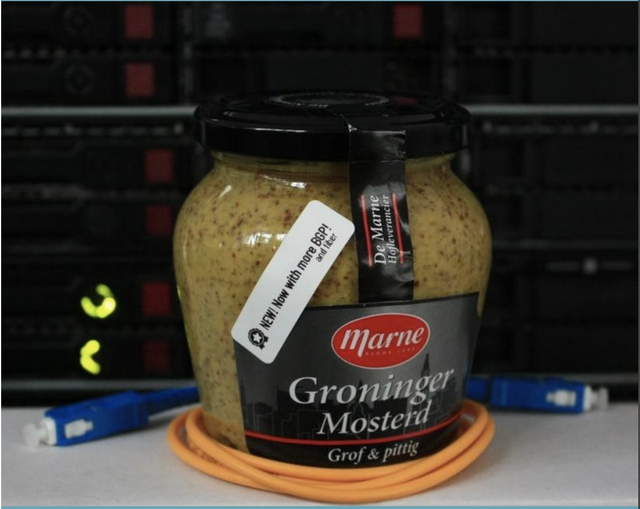
Address Policy closed with Leo Vegoda talking about the community's relationship with law enforcement agencies and other government-adjacent organisations, provoking an interesting conversation about how organisations who often have to maintain strict confidentiality can best interact with a community that puts so much stock in transparency.
In the other room, the IoT Working Group kicked off with a presentation from Eric van Uden on BBF IoT operator activities. Poonam Yadav then presented about identifying security weaknesses in IoT thread networks. Next up, Jad El Cham gave the RIPE NCC’s IoT Update. He closed by noting that the RIPE NCC Survey 2023 showed 22% of respondents had requested more training on IoT, so he asked for feedback about whether the community still wanted to see more IoT training content from the RIPE NCC. The session concluded with a WG chair selection, which saw Peter Steinhäuser re-elected as co-chair. Congratulations, Peter!
After lunch, today’s RIPE NCC Services WG session started with co-chair Bijal Sanghani reconfirming that this was, indeed, still everybody’s favourite WG. Recognising that so few of you scoundrels ever actually read the RIPE NCC’s Annual Report, Hans Petter took us through the document as part of his general RIPE NCC Update – nowhere to run, people! We also learned an interesting fact about Internet history. Ever wondered why the root server managed by the RIPE NCC is K-root? Ask our founder, Daniel Karrenberg…
Among other things, Felipe Victolla Silviera’s Technology Update discussed how we plan to reduce our data centre footprint, which coincided with the arrival of a thunderstorm - cloud strategy indeed! Tim Bruijnzeels then detailed improvements in RPKI operations, including UI enhancements and hardware upgrades. Marco Schmidt, filling in for an unwell James Kennedy, gave the Registry Update, noting they had achieved a “world-class” Net Promoter Score eight months running, which drew a hearty applause from the audience. At the end of the session, Bijal noted that she would be stepping down as WG Chair for the next RIPE Meeting and encouraged others to consider running. Thanks, Bijal!
The day concluded with the RIPE NCC General Meeting, which is where we’ll leave off. Here’s hoping for better weather tomorrow!
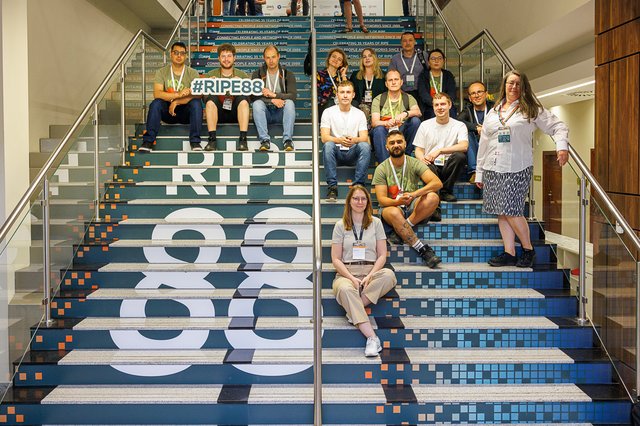
Tuesday: Slow down and read the steno
Dzień dobry everyone - it’s Day 2 of RIPE 88 in Krakow. You know the day is off to a good start when your coffee is a work of art…

If you missed yesterday’s newcomers’ quiz, Ondřej has a fresh question for you.
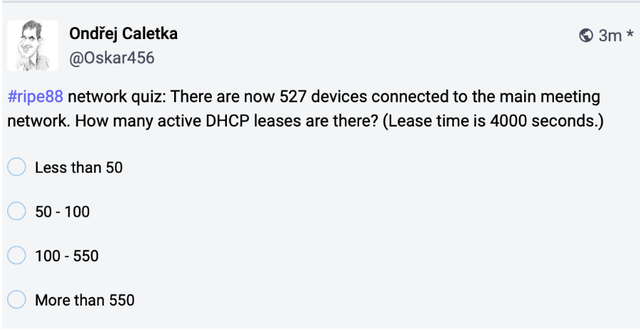
Word of the day: Clabernetes
We began the first plenary session with a talk by Carl Montanari and Simon Peccaud about a mix of containerlab and Kubernetes, ergo Clabernetes. This offers a solution to scalability issues with lab topologies.
Maria Isabel Gandía Carriedo talked about the tools survey result that the GEANT SIG-NOG group ran. The survey showed that NOCs use a variety of tools, and that apparently no single tool has all that is needed. If you’re looking for a great business idea - you might want to talk to Maria.
Sawsan El Zahr presented remotely about carbon aware routing. In simulations, a technique that would dynamically shut down ports showed the highest savings, especially for day-time traffic whereas routing bottlenecks limit carbon savings.
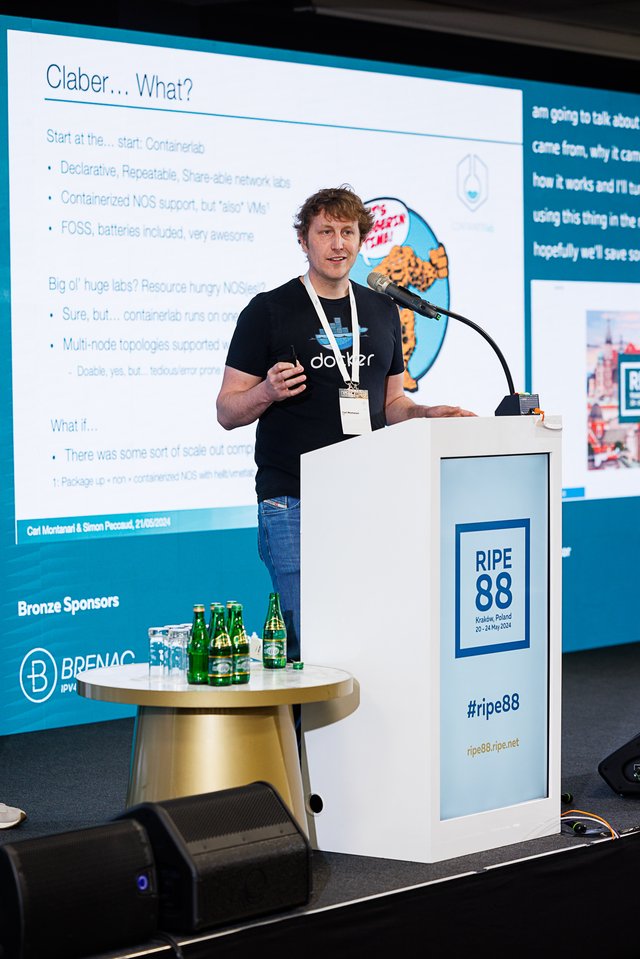
The writing on the wall
In the second plenary session of the day, Joshua Levett showed Internet topologies and the levels of interconnection between countries. The Internet is getting more dense in the highly interconnected parts of the world, and we see longer paths in regions that are less interconnected. Interestingly, countries with higher levels of censorship have lower levels of geographic interconnection, and therefore longer AS paths.
Tobias Fiebig gave one of everyone’s favourite kinds of presentations - in which he spoke about mistakes made while running Internet measurements, particularly in academia. He also spoke about the pressure on academics to constantly publish. He also introduced the measurement.network platform and asked the RIPE community to provide feedback.
“Whose CIDR is it anyway?”, asked Jan Schaumann. His painstakingly acquired data shows how the top 10 IPv4 holders together hold 30% of IPv4 address space, and how a handful of countries have the most IPv4 addresses. The good news is that IPv6 is much more evenly distributed.
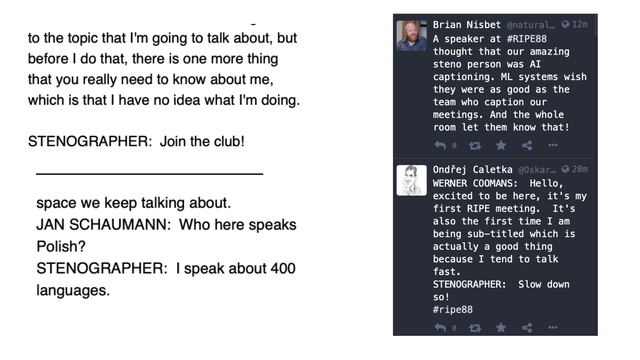
The end of IPv4
Radu Anghel presented statistics on the increase of personal use AS numbers across different regions leading to a lively debate about whether or not this is actually a problem.
Werner Coomans from Nokia spoke about L4S, an alternative congestion control mechanism to allow lower latency in network connections. This protocol has already been implemented within applications, and in the OS network stack.
There were three lightning talks. Luca Sani spoke about a Linux tool called Pietrasanta Traceroute, named after a town in Tuscany, that checks on ECN mechanisms in the IP packet header.
The Czech government will stop providing services over IPv4 on 6 June 2032, as Ondřej Filip informed us. 20 years after the IPv6 Launch Day is enough time to make the shift. They even have a countdown clock on their ambitiously-named website https://endofipv4.cz/en/. Just another 2,937 days to go.
Lastly, Libor Peltan issued a rather confusing warning, his talk was about kNOT DNS (who are we kidding, it’s always DNS). Luckily no one left the room and he proceeded to talk about MUSIC (multi-provider multi-signers) and scenarios for multi-signing.
Getting down to work
We then moved on to the first working group sessions of RIPE 88 - with Anti-Abuse and MAT taking place (and not Address Policy first as Brian Nisbet pointed out). Brian was re-selected Chair of the Anti-Abuse Working Group.
Maria Stafyla, RIPE NCC’s Senior Legal Counsel, spoke about the RIPE NCC’s role in handling illegal online content. Yury Zhaunarovich then quizzed the audience on acronyms - BGP, RTBH, UTRS, and proceeded to talk about DDoS prevention.
Hat on hat off?
The Anti-Abuse Working Group also discussed revising the group’s charter. Niall went to the mic, literally wore his RIPE Vice Chair hat, and took it off to speak as himself. The hat went back on again (and off again) as Niall explained the nuances of the Policy Development Process.
The Measurements and Tools (MAT) Working Group saw presentations by Savvas Kastanaki, Simon Fernandez, Pavlos Sermpezis, Eric Lanfer and Robert Kisteleki covering modelling inter-domain routing, the consistency of Whois and RDAP protocols, identifying biases in Internet measurements using AI4NetMon, Starlink’s network performance and RIPE NCC tools. Just like the weather, what’s in a cloud is always a topic for conversation - and the MAT Working Group saw a lively discussion on cloud services.
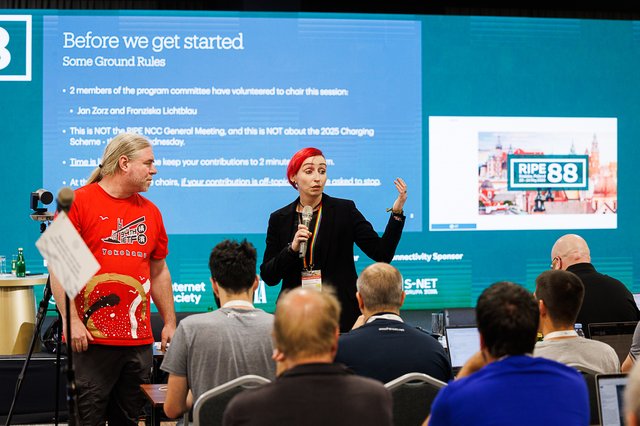
The Elephant in the Room?
The day ended with the BoF on building a stable future for the RIPE NCC. The room was packed as the community came together to take on the challenging conversation around future-proofing the RIPE NCC. The BoF follows up on Remco van Mook’s article and is the starting point for conversations that will continue to take place over the week.
And in case you were wondering, no, our stenos are not AI and this blog was not written by ChatGPT…
P.S. If you haven’t worked out the answer to Ondrej’s question, you can find the answer here.
Monday
You're as new as you feel...
The Newcomers' Introduction brought together first time attendees and ahem repeat first-time attendees to get to know what they're in for for the next five days learn more about RIPE Meetings. If you don't know the difference between RIPE and the RIPE NCC, watch the recording in the archives...
As always, it ended with a quiz by Kahoot! extraordinaire Gerardo Viviers, who seems to have added even more sound effects to his repertoire. The Newcomers' Kahoot! was won (not by Europapa) but by a "Newcomer", who showed true RIPE community spirit by agreeing to hand over the prize to an actual first-time attendee.
There was a storm warning before the next session with phones pinging here, there and everywhere but it passed and no one seemed too bothered by it. And the rain clouds never descended.
RIPE 88: Will there be cake?
The Opening Plenary began with a welcome from RIPE Chair Mirjam Kühne. She hinted that there may well be cake later in the week to celebrate RIPE’s 35th birthday. Yes, it really has been thirty-five years since the RIPE community began it all with RIPE 1! She asked us to reflect and remember the achievements of the community over the past three decades and also look forward, which will be the topic of discussion at the BoF on Tuesday evening about Building A Stable Future for the RIPE NCC.
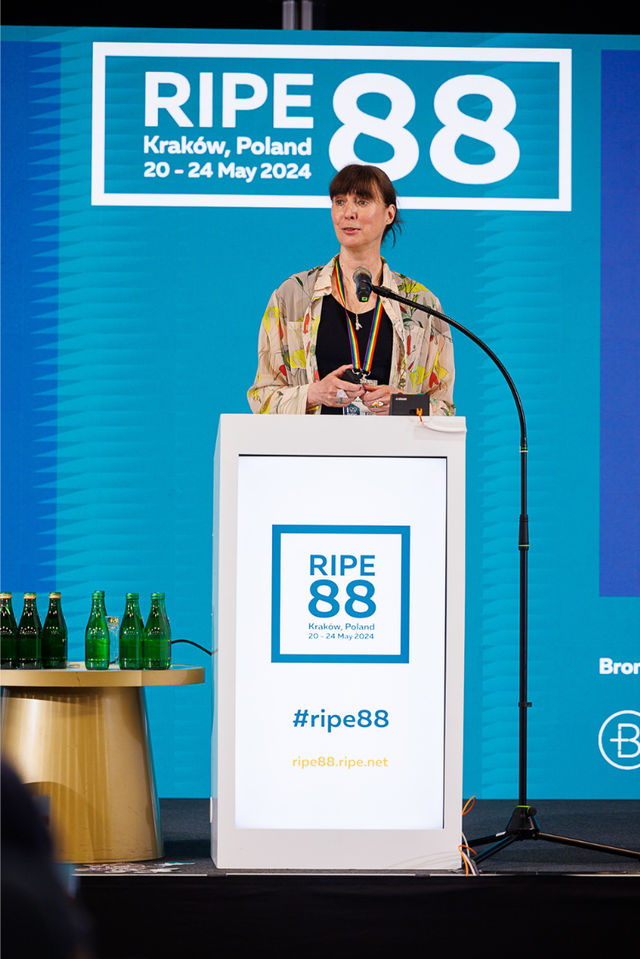
Patrick Bussmann from Akamai, the local host, welcomed everyone to Kraków and said that they have more than 12 years of history in Poland with more than 1,000 employees locally in their biggest office globally. But the key information came with the introduction of their new representative: the duck, no… penguin… or is it a platypus? Let them know what you think!
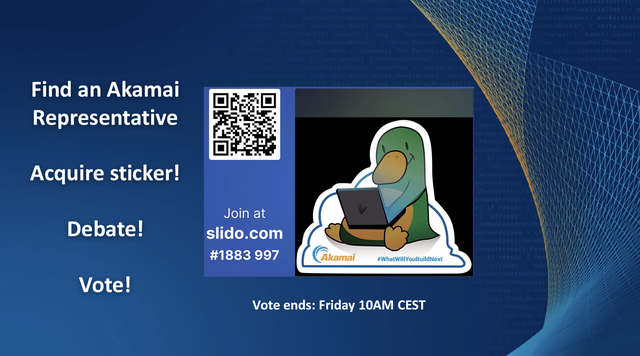
Next up was Hans Petter Holen with a welcome from the RIPE NCC, and he presented about the logistics of attending the RIPE Meeting. He asked the community to be engaged to let us know how the NCC services are performing and how they can be improved—and to be proud of what we achieved together.
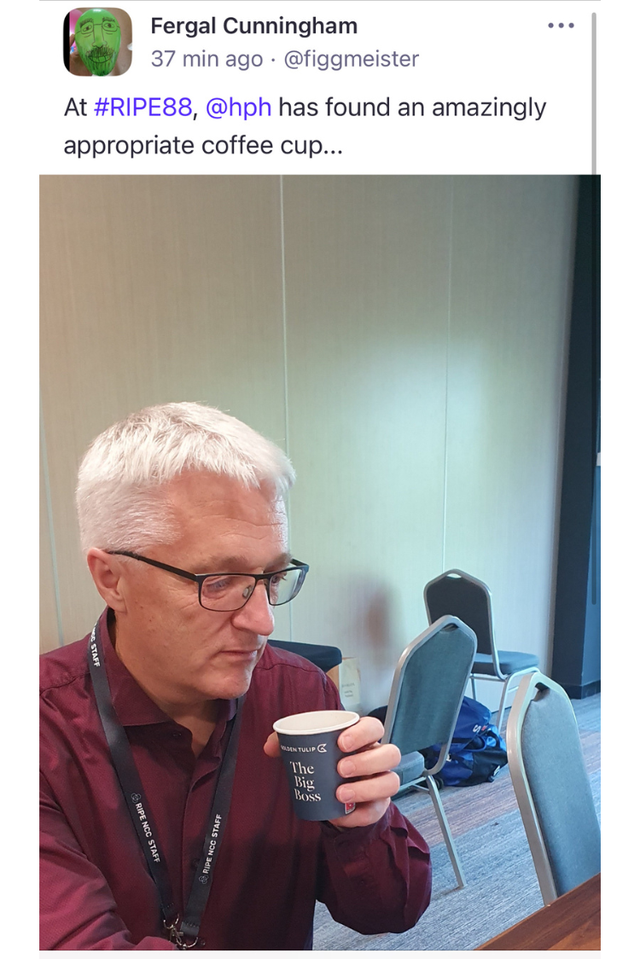
Massimiliano Stucchi represented the Programme Committee and took the - now traditional - selfie and explained what the Programme Committee was all about.
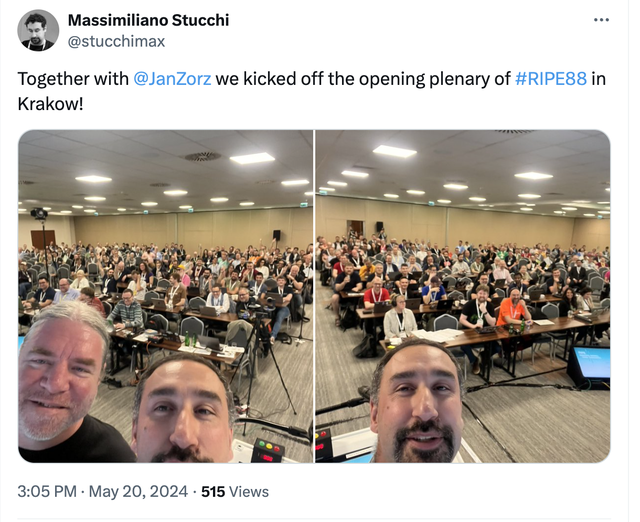
Continuing the Opening Plenary, Matthew Kirkland from Meta Platforms discussed phasing out IPv4 infrastructure to simplify Meta’s edge network, addressing scaling issues and planning overhead, sparking lively discussions. Thomas Weible from Flexoptix followed with a talk on Coherent Optical Transceivers as future game-changers.
In the second Plenary of the day, Kemal Sanjta from ThousandEyes highlighted how 1% packet loss severely reduces throughput, advocating for Google's BBR over TCP's CUBIC. Asbjørn Sloth Tønnesen from Fiberby ApS presented an energy-efficient IP forwarding approach using NICs, leading to eco-friendly routing discussions. Lai Yi Ohlsen from Measurement Lab urged organisations to contribute servers to diversify network measurement vantage points. Christian Seitz from Individual Network Berlin e.V. introduced Community-IX, simplifying sponsorship for non-profits with free IP transit. Finally, Vladimir Vassilev from Lightside Instruments AS advocated for standardising a YANG/NETCONF interface for network testers to enhance reliability and interoperability.
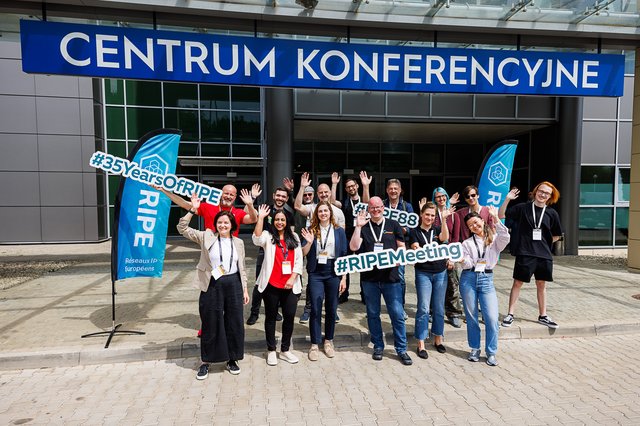
The meeting came to an end with a BoF with Hanna Kreitem from the Internet Society which explored Pulse, a platform that aggregates various measurements related to the Internet's health.
The evening wrapped up with the welcome reception and a cooking demo of Polish pierogis (dumplings).

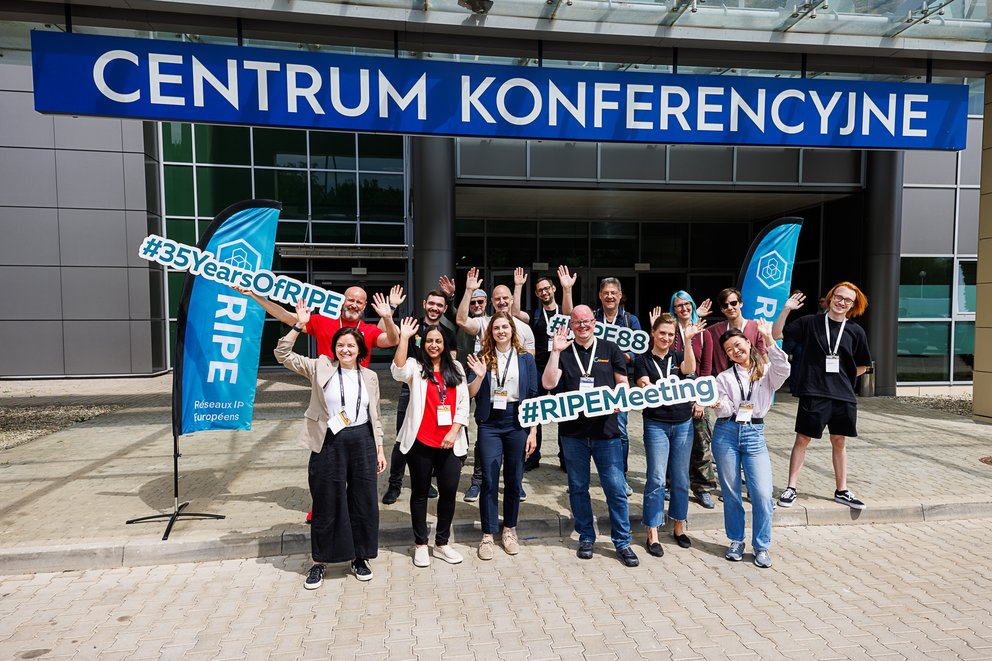
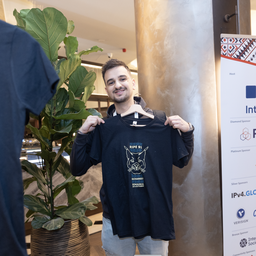
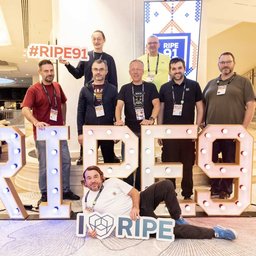

Comments 0
The comments section is closed for articles published more than a year ago. If you'd like to inform us of any issues, please contact us.